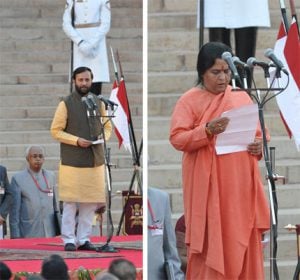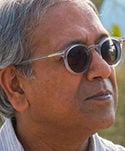As India’s new government led by Narendra Modi took office after sweeping the Congress party out of power, environmentalists sounded pleasantly surprised by the choice of ministers. Prakash Javadekar is the minister for environment, forests and climate change, with the last two words having been added to the name of the ministry. Uma Bharti is the minister in charge of water resources and of cleaning the Ganga.
Until recently a member of parliament in the opposition benches, Javadekar has been actively associated with GLOBE, a global legislators’ organisation set up to push sustainable development. The group has been active in the climate change arena in recent years. Javadekar was the first president of the India chapter and has been a vocal participant at international meets, such as Rio+20.
However, there are two worries with Javadekar’s appointment. The first is that environment, forests and climate change is not his only portfolio. He is also the minister for information and broadcasting. Having been a Bharatiya Janata Party (BJP) spokesperson for a long time, that is one of his areas of interest. How Javadekar divides his time between his two portfolios remains to be seen.
The second worry is that Javadekar has been among those who have criticised the environment ministry in the past for not permitting industrial and infrastructure projects when there was a risk of damage to the environment. This has been at the heart of the so-called ‘development versus environment’ debate in India for many years now. Environmentalists are hoping the Supreme Court will take the whole matter out of the hands of the ministry and entrust it to an independent regulator, to be called the National Environment Assessment and Monitoring Authority.
Independent environmentalist Raman Mehta told thethirdpole.net, “The positive aspect of the move is that the administration has explicitly recognised that climate change is an issue and needs to be dealt with. However, Javadekar’s environment credentials remain unknown. I hope he will be an environment minister who will try to uphold the regulatory structures and processes rather than seeking to undermine it for speedy and expediting clearances of projects.”
Chandra Bhushan of the think tank Centre for Science and Environment welcomed the extension of the environment minister’s portfolio to include climate change. He said, “This is very important symbolically as it shows that India is serious about climate change. We welcome the move.”
Rejuvenating the Ganga
As for Uma Bharti, apart from being the new water resources minister, she is in charge of a ministry created to rejuvenate the Ganga. New prime minister Narendra Modi had promised to clean the India’s holiest river, and has been elected to parliament from Varanasi – simultaneously one of Hinduism’s top pilgrimage centres, the world’s oldest city that has been continuously lived in for around 5,000 years, and a major pollution hotspot.
Some way upstream from Varanasi on the Ganga, Rakesh Jaiswal runs the NGO Eco Friends in Kanpur, another pollution hotspot. Reacting to Bharti’s appointment, he told thethirdpole.net, “I have not met her, but she has been campaigning for cleaning the Ganga even before the elections.” The new minister is a Hindu monk, and the cleaning of the river considered holiest by millions of Hindus is known to be close to her heart.
However, Bharti did court controversy earlier this year when she said sand mining on the Ganga riverbed did not have to be stopped as long as it was done in an eco-friendly manner. This is contrary to the point of view of most environmentalists.
Talking about the new ministry to rejuvenate the Ganga, Jaiswal said, “It is good to see that the new PM is dedicated to clean the Ganga. But the new government needs to take concrete actions immediately if the national river is to be saved. There are two main issues – pollution and dearth of water in the river during lean periods. The government needs to put back half of the water carried by the Ganga from the Himalayas back into the main stream of the river instead of diverting it into canals. This doesn’t need money, just a strong commitment and decision-making. The government has been struggling since 1986 but there hasn’t been any improvement.”
Mallika Bhanot, an activist from a people’s movement called Ganga Ahvaan said that if the government really wants to restore the river then the focus has to be on the free flow of Ganga. “Uma Bharti has earlier spoken against the dams but I am not sure if she will be able to speak out while being in a BJP government. The government is shying away from the real concern by just focussing on the cleaning. Unless the free flow is maintained, nothing else makes sense. There are so many issues with respect to the Ganga – eco-sensitive zones, monitoring committees, dams, glaciers. Cleaning is just a small part.”
Bhanot has been campaigning against dams in Uttarakhand. She said that the new government needs to be careful about its policies in the Himalayan state so that a repeat of the last year’s landslide and flash-floods tragedy does not take place. ” Impact on any one valley can have a cascading effect on the other valleys like what we saw last year when during the tragedy, all the valleys along all the rivers got affected in one go. It is a very sensitive region and government needs to rethink its hydroelectric power policy.”
Talking about the choice of Uma Bharti and the clubbing of ministries, Manoj Mishra of Yamuna Jiye Abhiyaan said, “ The actual wording (of the ministries) is water resources, river development and ganga rejuvenation. Only time will tell if it is just a play on words or if they really mean what they are saying. Uma Bharti has been active in Ganga movement. She has more than once conveyed her commitment for the Ganga and we hope it means for all rivers. What is of concern is the phrase ‘river development’. We don’t know what it means, what they mean by the word ‘development’. It’s a loaded and worrisome term. We don’t want the rivers to be developed and they need to be left on their own. Will it mean river linking? We don’t know.”

